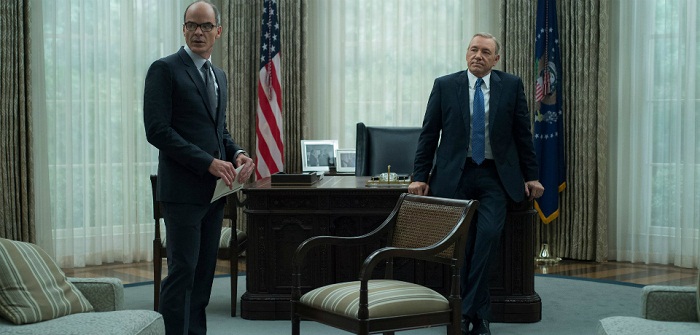Netflix’s binge-inducing political drama was released Friday and the latest installment picks up right at the moment where Season Three left off. President Frank Underwood, played by Kevin Spacey, is on the campaign trail in his election bid to hold onto the seat of power he has coveted throughout the series. Underwood’s relationship with his wife, Claire, played by Robin Wright, is strained — their marriage and political partnership is hanging in the balance. In the foreign policy world, House of Cards continues to pull the thread of the Russia plot line that it spun last season, with a financially-strained Kremlin now seeking an International Monetary Fund bailout. Victor Petrov, the show’s Putin-esque surrogate, is combative and paranoid of Washington’s meddling in Moscow, much to the chagrin of Spacey’s Underwood who is seeking to mend ties after the geopolitical fallout of Season Three.
As is becoming the norm with House of Cards, the show succeeds in ramping up the drama and taking its characters’ personal stories to new and unexpected places. But as with its second season’s China trade and politburo plotline, or the third season’s Russian intervention in the Jordan Valley, the show once again struggles to transform its soap opera formula into plausible foreign policy. But perhaps the more unforgivable sin is its cursory handling of an election cycle at a time when America is in the throes of its most dramatic — and unexpected — campaign in years.
But that doesn’t mean that House of Cards’ fourth season is a bust. Rather, it’s a reminder of what the show actually is: A dark, well-produced soap opera, not a reflection of anything resembling realistic politics — either at home or abroad.
Last season, the show devoted a huge stretch of its early episodes to international events: Claire had a brief stint as America’s ambassador to the United Nations before being forced out by behind-the-scenes intrigue involving Russia’s president. The show also touched on LGBT rights in Russia before moving on the Middle East, taking its soapy style to exploring a two-state solution with Israel and Palestine.
The fourth season once again doesn’t shy away from global storylines; it returns to Russia, but this time focuses on palace intrigue in the Kremlin. The writers have clearly borrowed from real events, looking to the February 2015 assassination of Russian opposition leader Boris Nemtsov and Putin’s purge of Yeltsin-era oligarchs in the early 2000s. Another looming foreign policy plotline involves an energy crisis with echoes of the 1973 OPEC oil embargo.
But the writers don’t always connect the dots in a coherent way. Oil prices have hit a new high in Season Four, but the show fails to explain how this has pushed Russia into an energy crisis. In another development that is sure to have major repercussions in future episodes, Washington and Beijing conspire to divide control of Siberian oil fields, with little explanation as to why they would cooperate so closely.
Luckily, the international events mostly loom ominously in the background and are a foil for drama in the United States that the show handles more eloquently. Skeletons in Underwood’s closet are brought out, Claire and Frank’s relationship is brought to its zenith, and ghosts from the show’s history return in full force after an Episode 4 twist. Sins are exposed, consequences are felt, and House of Cards does what it does best: it pits power-hungry characters against each other in an over-the-top slugfest.
Oddly, the campaign trail is relatively intrigue-free in the first half of the season. With House of Cards’ election cycle corresponding with the real-life primaries, the show had an opportunity to comment on the process in a meaningful way. In a time when pundits are currently dumbfounded by the motivations of American voters — from the surprising rise of non-traditional candidates like Bernie Sanders and Donald Trump — the show could have been truly relevant.
Instead, it feels divorced from the dark comedy that is U.S. politics in 2016. Few insights on the process, or the voters themselves, are offered as Season Four turns to old-fashioned politics: stump speeches, press conferences, and measured attacks by candidates. At other times, the campaign trail in House of Cards feels oddly dignified, with politicians choosing to hit each other in the shadows rather than slinging mud at one another.
Lost opportunities or not, the show is still entertaining — even if it sticks to the well-charted themes of power and loyalty it has carved out for itself. At times in this season, it’s easy to wonder what else this series has left. (Especially given that it has already exceeded much of its British source material). For four seasons, House of Cards has perfected its formula: Underwood tries to grab power, he’s met with resistance, he pushes back, Claire conspires in a well-tailored dress, and flash points from Charleston to Chechnya flare up to move the plot forward.
Still, House of Cards’ tried-and-tested formula is entertaining, and if the show can continue to pull it off with a wink and a smirk to the camera, it will continue to enthrall both inside and beyond the Beltway.
More about:
















































